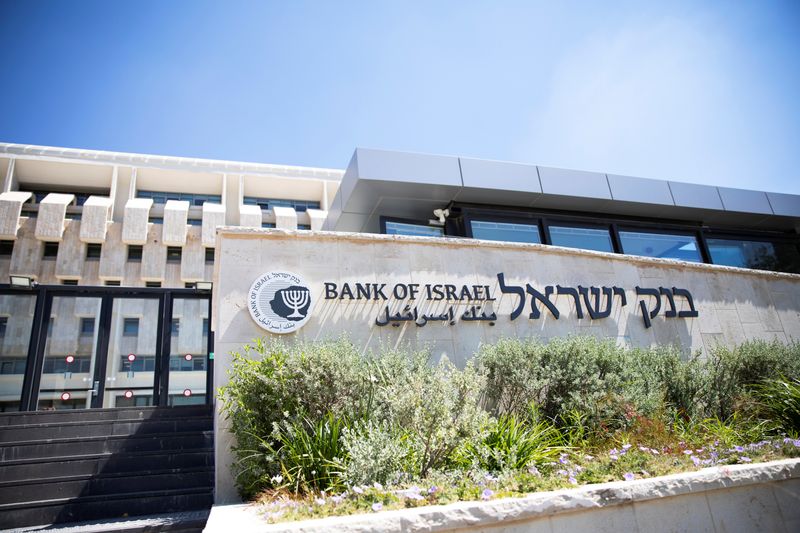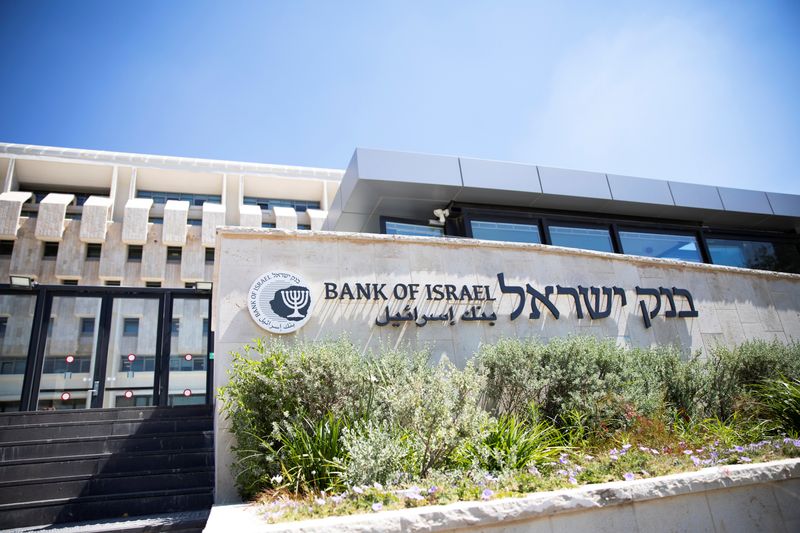Economy
Bank of Israel says too soon to lower rates due to war uncertainty


© Reuters. FILE PHOTO: The Bank of Israel building is seen in Jerusalem June 16, 2020. Picture taken June 16, 2020. REUTERS/Ronen Zvulun/File Photo
By Steven Scheer and Ari Rabinovitch
JERUSALEM (Reuters) -The Bank of Israel kept short-term borrowing rates unchanged for a fourth straight decision on Monday and said that it was too soon to lower interest rates due to economic and financial uncertainty during Israel’s war against Hamas.
The central bank held its benchmark rate at 4.75% – its highest level since late 2006. It had raised rates 10 straight times in an aggressive tightening cycle that has taken the rate from 0.1% last April before pausing in July and again in August and October.
All 14 economists polled by Reuters had forecast no rate change but with inflation coming down and the economy set to slow as a result of the war, analysts believe rate cuts could begin at the subsequent policy decision on Jan. 1, 2024.
“We need to recognise the fact that we are still in an environment of very high uncertainty,” Bank of Israel Governor Amir Yaron told a news conference after the decision.
“The hasty use of the interest rate tool in an environment of such significant uncertainty, if things reverse, it will only increase volatility in the financial markets and it could require time or bigger tools to fix it. Therefore, for now we are waiting for the entrenchment of stability in the financial markets and only after that we can weigh using monetary tools moreover.”
Yaron noted that Israel’s risk premium remained high, even though the has recovered 8% versus the dollar after sliding 6% at the outset of the war.
The central bank cut its forecasts for economic growth in 2023 and 2024 in view of the impact of the war, now seeing an expansion of 2% next year, down from 2.8% a month ago – given an expectation that the war will be contained near the Gaza border and continue into 2024.
The forecast estimates that the budgetary costs of the war – expenditures plus loss of income – are expected to total 10% of GDP.
WAR SPENDING
Central bank economists also trimmed their 2023 growth estimate to 2% from 2.3%, and expect an inflation rate of 2.4% in the coming year. Their staff estimate envisaged the key interest rate falling to range of 3.75% to 4.0% by the end of 2024.
Officials have previously cautioned that steep rate cuts at the moment would weaken the shekel and push up inflation.
In its statement, the central bank pointed to the conditions needed for it to provide a more supportive monetary policy.
“The interest rate path will be determined in accordance with developments in the war and the uncertainty derived from it,” it said.
Israel’s inflation rate eased to 3.7% in October from 3.8% in September to remain above an annual target range of 1%-3%. Yaron said that despite stable inflation, much still depended on the relative severity of the supply limitations and the decline in demand stemming from the war.
The central bank estimated state spending on the war of around 160 billion shekels ($43 billion) and Yaron urged fiscal discipline by cutting less essential spending.
Yaron this month accepted a second five-year term to begin in 2024. Earlier on Monday, the head of parliament’s finance committee, Moshe Gafni, lashed out at Yaron and called him a “bad governor”.
($1 = 3.7154 shekels)
Economy
Russian central bank says it needs months to make sure CPI falling before rate cuts -RBC


© Reuters. Russian Central Bank Governor Elvira Nabiullina attends a news conference in Moscow, Russia June 14, 2019. REUTERS/Shamil Zhumatov/File Photo
MOSCOW (Reuters) – Russia’s central bank will need two to three months to make sure that inflation is steadily declining before taking any decision on interest rate cuts, the bank’s governor Elvira Nabiullina told RBC media on Sunday.
The central bank raised its key interest rate by 100 basis points to 16% earlier in December, hiking for the fifth consecutive meeting in response to stubborn inflation, and suggested that its tightening cycle was nearly over.
Nabiullina said it was not yet clear when exactly the regulator would start cutting rates, however.
“We really need to make sure that inflation is steadily decreasing, that these are not one-off factors that can affect the rate of price growth in a particular month,” she said.
Nabiullina said the bank was taking into account a wide range of indicators but primarily those that “characterize the stability of inflation”.
“This will take two or three months or more – it depends on how much the wide range of indicators that characterize sustainable inflation declines,” she said.
The bank will next convene to set its benchmark rate on Feb. 16.
The governor also said the bank should have started monetary policy tightening earlier than in July, when it embarked on the rate-hiking cycle.
Economy
China identifies second set of projects in $140 billion spending plan


© Reuters. FILE PHOTO: Workers walk past an under-construction area with completed office towers in the background, in Shenzhen’s Qianhai new district, Guangdong province, China August 25, 2023. REUTERS/David Kirton/File Photo
SHANGHAI (Reuters) – China’s top planning body said on Saturday it had identified a second batch of public investment projects, including flood control and disaster relief programmes, under a bond issuance and investment plan announced in October to boost the economy.
With the latest tranche, China has now earmarked more than 800 billion yuan of its 1 trillion yuan ($140 billion) in additional government bond issuance in the fourth quarter, as it focuses on fiscal steps to shore up the flagging economy.
The National Development and Reform Commission (NDRC) said in a statement on Saturday it had identified 9,600 projects with planned investment of more than 560 billion yuan.
China’s economy, the world’s second largest, is struggling to regain its footing post-COVID-19 as policymakers grapple with tepid consumer demand, weak exports, falling foreign investment and a deepening real estate crisis.
The 1 trillion yuan in additional bond issuance will widen China’s 2023 budget deficit ratio to around 3.8 percent from 3 percent, the state-run Xinhua news agency has said.
“Construction of the projects will improve China’s flood control system, emergency response mechanism and disaster relief capabilities, and better protect people’s lives and property, so it is very significant,” the NDRC said.
The agency said it will coordinate with other government bodies to make sure that funds are allocated speedily for investment and that high standards of quality are maintained in project construction.
($1 = 7.1315 renminbi)
Economy
Russian central bank says it needs months to make sure CPI falling before rate cuts -RBC


© Reuters. Russian Central Bank Governor Elvira Nabiullina attends a news conference in Moscow, Russia June 14, 2019. REUTERS/Shamil Zhumatov/File Photo
MOSCOW (Reuters) – Russia’s central bank will need two to three months to make sure that inflation is steadily declining before taking any decision on interest rate cuts, the bank’s governor Elvira Nabiullina told RBC media on Sunday.
The central bank raised its key interest rate by 100 basis points to 16% earlier in December, hiking for the fifth consecutive meeting in response to stubborn inflation, and suggested that its tightening cycle was nearly over.
Nabiullina said it was not yet clear when exactly the regulator would start cutting rates, however.
“We really need to make sure that inflation is steadily decreasing, that these are not one-off factors that can affect the rate of price growth in a particular month,” she said.
Nabiullina said the bank was taking into account a wide range of indicators but primarily those that “characterize the stability of inflation”.
“This will take two or three months or more – it depends on how much the wide range of indicators that characterize sustainable inflation declines,” she said.
The bank will next convene to set its benchmark rate on Feb. 16.
The governor also said the bank should have started monetary policy tightening earlier than in July, when it embarked on the rate-hiking cycle.

 Forex2 years ago
Forex2 years agoForex Today: the dollar is gaining strength amid gloomy sentiment at the start of the Fed’s week

 Forex2 years ago
Forex2 years agoHow is the Australian dollar doing today?

 Forex1 year ago
Forex1 year agoUnbiased review of Pocket Option broker

 Forex2 years ago
Forex2 years agoDollar to pound sterling exchange rate today: Pound plummeted to its lowest since 1985

 Cryptocurrency2 years ago
Cryptocurrency2 years agoWhat happened in the crypto market – current events today

 World2 years ago
World2 years agoWhy are modern video games an art form?

 Stock Markets2 years ago
Stock Markets2 years agoMorgan Stanley: bear market rally to continue

 Economy2 years ago
Economy2 years agoCrude oil tankers double in price due to EU anti-Russian sanctions

































